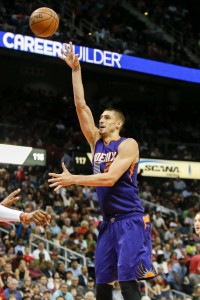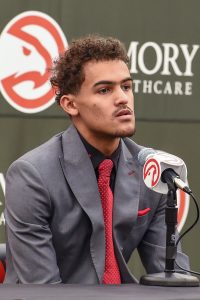Having torn down the Hawks’ roster in his first summer as the team’s general manager a year ago, Travis Schlenk was in no hurry to accelerate the rebuild in his second offseason.
Rather than using the No. 3 overall pick on a player many experts viewed as the top prospect in the draft (Luka Doncic), Schlenk traded down to No. 5, selecting a more divisive prospect (Trae Young) and acquiring an extra 2019 first-rounder in the process.
Instead of using Atlanta’s excess cap room to pursue a promising young restricted free agent or two, Schlenk used it to absorb Carmelo Anthony‘s $28MM salary, acquiring a draft pick that the Hawks won’t receive until at least 2022. On top of that, the Hawks included their most productive player (Dennis Schroder) in the trade, leaving the roster without anyone who averaged more than 14.1 PPG in 2017/18.
The Hawks’ roster-building strategy might not be quite as extreme as “The Process” used in Philadelphia, but it’s not far off. So it made sense that the team hired a Sixers assistant, Lloyd Pierce, to replace Mike Budenholzer, a veteran coach who didn’t have much interest in a lengthy rebuild.
Key offseason losses:
In Schroder, the Hawks had a 24-year-old point guard whose numbers had consistently improved since he entered the NBA and whose contract ($15.5MM per year through 2020/21) was fairly team-friendly. He looked like the sort of piece a retooling franchise could build around, rather than one it needed to jettison.
However, whispers about Schroder’s personality and locker-room fit diminished his value, and a misdemeanor battery charge didn’t help matters. The young guard hinted in the spring that he’d rather be traded to a playoff team than spend more time on a lottery-bound squad, and the Hawks’ top decision-makers seemed happy to oblige, having neither drafted nor extended Schroder themselves.
While the Hawks didn’t necessarily extract significant value out of Schroder on the trade market, dealing him may be the best move for the franchise in the long term. Besides his off-court issues, the 2013 first-rounder wasn’t a particularly strong shooter or defender. Given how high the club is on Young as its lead guard of the future, the time seemed right to move on from Schroder.
Outside of Schroder, few of the Hawks’ departing players were crucial pieces. Mike Muscala provided the team with reliable minutes up front, and Malcolm Delaney and Isaiah Taylor had some solid games in the backcourt, but they weren’t irreplaceable by any means.
Key offseason additions:
The draft-night trade that saw the Hawks pass on Doncic to select Young is the sort of move that could ultimately cost a general manager his job if it doesn’t work out. Schlenk, a former Warriors executive, is making a strong bet on Young, who has drawn comparisons to Stephen Curry but probably doesn’t have quite as much upside as the two-time MVP.
Still, despite a lack of size and some concerns about his defense, Young’s offensive potential is tantalizing. He could develop into one of the best shooters and play-makers in the NBA within the next few years — if he does, the Hawks won’t have to worry about how Doncic performs in Dallas. On the other hand, if Young struggles to make an impact in his first couple NBA seasons or battles consistency issues, Schlenk’s blockbuster trade could go down as a major misstep in Hawks history. It’ll be a fascinating subplot to monitor.
Outside of Young, the Hawks added a variety of young prospects and veterans during the offseason. The club used its later first-round picks to add Kevin Huerter and Omari Spellman, then filled out its roster in free agency with modest deals for Alex Len, Daniel Hamilton, and Vince Carter.
While Carter almost certainly won’t stick with the Hawks for more than a year, his presence as a veteran mentor could set a good example for the team’s young roster. Len and Hamilton, meanwhile, are low-risk investments who have some promise and could earn consideration as part of Atlanta’s longer-term future if they look good in 2018/19.
Outlook for 2018/19:
Since the 2014/15 season, the Hawks have seen their win totals steadily drop from 60 to 48 to 43 to 24. It’s possible that decline could continue — a number of oddsmakers, including Bovada.lv, have put Atlanta’s over/under for 2018/19 at just 23.5 wins, the lowest mark in the NBA.
Still, another season at or near the bottom of the NBA standings would hardly be a disaster for the Hawks. The goal for 2018/19 will be to continue developing young players like John Collins and Taurean Prince while integrating newly-added prospects such as Young, Huerter, and Spellman.
As long as those players make strides and the franchise starts building the type of culture that Schlenk and Pierce want to see in Atlanta, the season should be viewed as a relative success. With as many as three potential lottery picks at their disposal in 2019, the Hawks are still very much in the midst of their rebuild and won’t be skipping any steps along the way.
Salary information from Basketball Insiders was used in the creation of this post. Photos courtesy of USA Today Sports Images.

